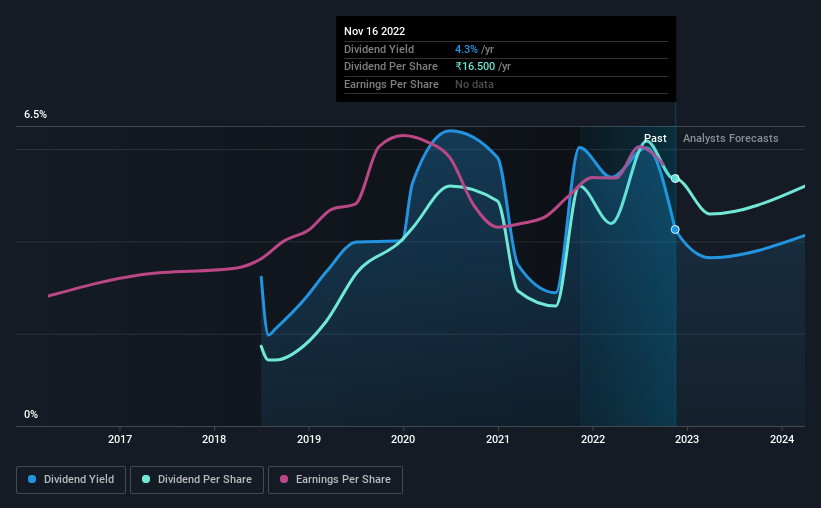- India
- /
- Professional Services
- /
- NSEI:RITES
RITES (NSE:RITES) Is Paying Out A Larger Dividend Than Last Year

RITES Limited (NSE:RITES) will increase its dividend from last year's comparable payment on the 10th of December to ₹4.50. This will take the dividend yield to an attractive 4.3%, providing a nice boost to shareholder returns.
While the dividend yield is important for income investors, it is also important to consider any large share price moves, as this will generally outweigh any gains from distributions. Investors will be pleased to see that RITES' stock price has increased by 43% in the last 3 months, which is good for shareholders and can also explain a decrease in the dividend yield.
Check out our latest analysis for RITES
RITES' Earnings Easily Cover The Distributions
While it is great to have a strong dividend yield, we should also consider whether the payment is sustainable. The last dividend made up a very large portion of earnings and also represented 85% of free cash flows. This is usually an indication that the focus of the company is returning cash to shareholders rather than reinvesting it for growth.
Over the next year, EPS is forecast to expand by 18.6%. If recent patterns in the dividend continues, the payout ratio in 12 months could be 91% which is a bit high but can definitely be sustainable.

RITES' Dividend Has Lacked Consistency
Even in its short history, we have seen the dividend cut. The annual payment during the last 4 years was ₹5.32 in 2018, and the most recent fiscal year payment was ₹16.50. This works out to be a compound annual growth rate (CAGR) of approximately 33% a year over that time. Dividends have grown rapidly over this time, but with cuts in the past we are not certain that this stock will be a reliable source of income in the future.
Dividend Growth Could Be Constrained
With a relatively unstable dividend, it's even more important to see if earnings per share is growing. RITES has impressed us by growing EPS at 11% per year over the past five years. The payout ratio is very much on the higher end, which could mean that the growth rate will slow down in the future, and that could flow through to the dividend as well.
In Summary
Overall, we always like to see the dividend being raised, but we don't think RITES will make a great income stock. Strong earnings growth means RITES has the potential to be a good dividend stock in the future, despite the current payments being at elevated levels. We don't think RITES is a great stock to add to your portfolio if income is your focus.
Investors generally tend to favour companies with a consistent, stable dividend policy as opposed to those operating an irregular one. At the same time, there are other factors our readers should be conscious of before pouring capital into a stock. Taking the debate a bit further, we've identified 1 warning sign for RITES that investors need to be conscious of moving forward. Looking for more high-yielding dividend ideas? Try our collection of strong dividend payers.
New: AI Stock Screener & Alerts
Our new AI Stock Screener scans the market every day to uncover opportunities.
• Dividend Powerhouses (3%+ Yield)
• Undervalued Small Caps with Insider Buying
• High growth Tech and AI Companies
Or build your own from over 50 metrics.
Have feedback on this article? Concerned about the content? Get in touch with us directly. Alternatively, email editorial-team (at) simplywallst.com.
This article by Simply Wall St is general in nature. We provide commentary based on historical data and analyst forecasts only using an unbiased methodology and our articles are not intended to be financial advice. It does not constitute a recommendation to buy or sell any stock, and does not take account of your objectives, or your financial situation. We aim to bring you long-term focused analysis driven by fundamental data. Note that our analysis may not factor in the latest price-sensitive company announcements or qualitative material. Simply Wall St has no position in any stocks mentioned.
About NSEI:RITES
RITES
Provides design, engineering consultancy, and project management services in the field of railways, highways, airports, metros, ports, ropeways, urban transport, inland waterways, and renewable energy.
Very undervalued with flawless balance sheet.
Similar Companies
Market Insights
Community Narratives




